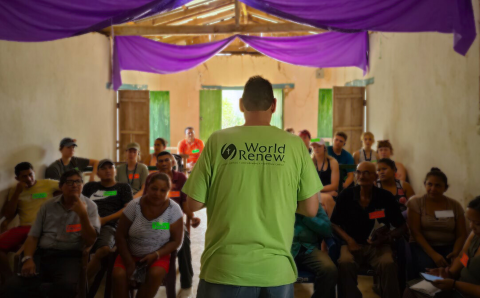How can we understand God’s sovereignty without logically implying that God was the creator of evil?
When Job and his wife lost everything, her advice to him was to “curse God and die.” As she saw it, if God is sovereign, the creator and ruler of all things, then God must also be the one who targeted so much evil against her and her husband. If so, God then deserved to be cursed.
We can understand how she felt. Her words give voice to something that might linger in our own minds in times of tragedy and loss: “Why did God do this? If God is indeed sovereign, then God must be responsible for this. And if God is responsible for this, then God is no longer worthy of my worship. ‘Curse God and die’ sounds exactly right.”
But what if Job’s wife was wrong?
The Belgic Confession teaches this about God: “(T)here is a single and simple spiritual being, whom we call God—eternal, incomprehensible, invisible, unchangeable, infinite, almighty; completely wise, just, and good, and the overflowing source of all good” (Art. 1, italics mine).
If God is completely good—if goodness is who God is—then God cannot create evil. When we say “God is good all the time,” we are not saying that our experience of God is good all the time. We say “God is good all the time” the way you may say “Mary has green eyes all the time.” Goodness is who God is. God can’t not be good. God can’t create anything that isn’t good.
Evil invaded God’s good creation through the deception of Satan, a rebel angel who wooed the two humans to listen to him and not to God. But the introduction of evil did not lead God to throw up his hands and walk away from the world he created.
The Belgic Confession again:
We believe that this good God, after creating all things, did not abandon them to chance or fortune but leads and governs them according to his holy will, in such a way that nothing happens in this world without God’s orderly arrangement.
Yet God is not the author of, and cannot be charged with, the sin that occurs. For God’s power and goodness are so great and incomprehensible that God arranges and does his works very well and justly even when the devils and the wicked act unjustly (Art. 13).
This is something Job understood. To his wife’s suggestion, he says, “Shall we accept good from God, and not trouble?” (Job 2:10)
This doesn’t mean that Job doesn’t grieve, or wrestle with God, or wonder why this has all happened. That’s the rest of the book. But Job does all of those things knowing that God is sovereign. Job holds both his deep grief and his deep questions before the face of God, as we still do.
But we know more than Job did. As Francis Spufford writes in his book Unapologetic, “We don’t have an argument that solves the problem of the cruel world, but we have a story.” We have a story of a God who took on our flesh and all of its pain, who lived in this world of betrayal and grief, who loved so deeply that he wept at the grave of a friend. We have the storytellers of font and table reminding us that the God who took on flesh claims us as God’s own and prepares a table before us in the presence of evil itself because God is sovereign, and God has won.
About the Author
Mary Hulst is university pastor for Calvin University and teaches at Calvin Theological Seminary, Grand Rapids, Mich.









